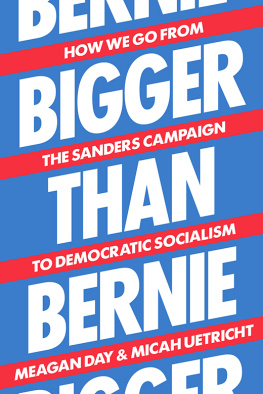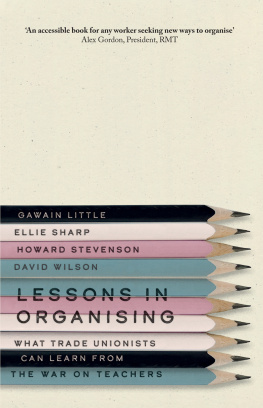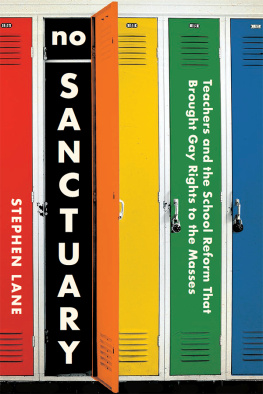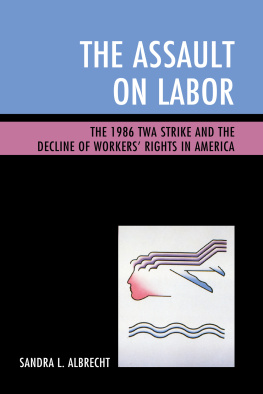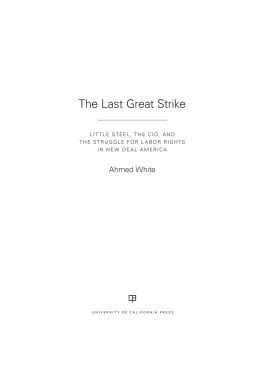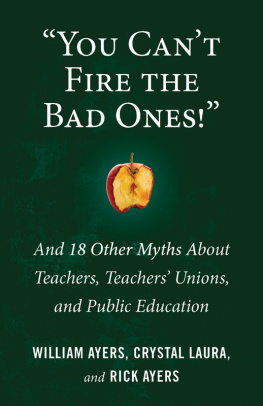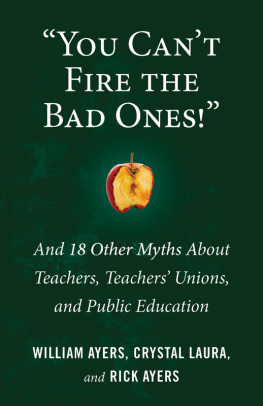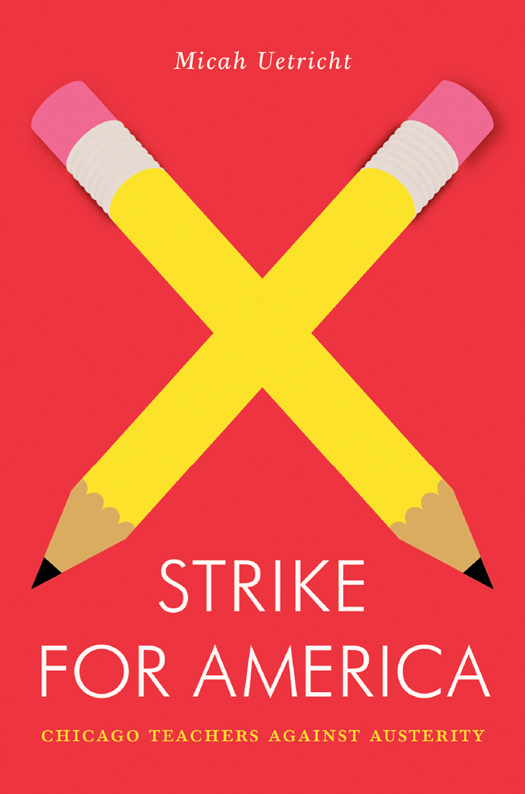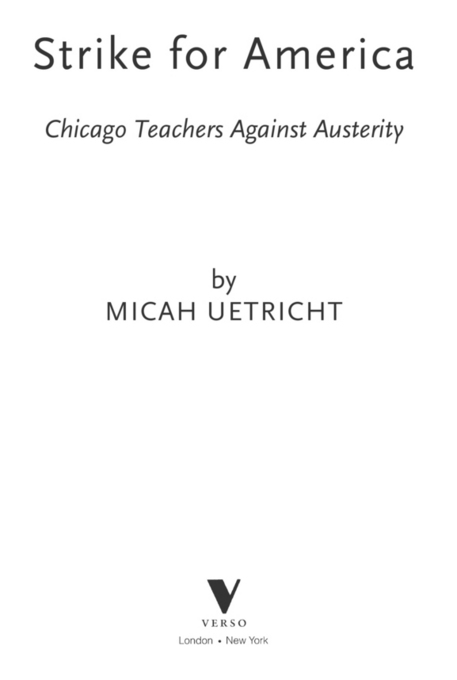First published by Verso 2014
Micah Uetricht 2014
All rights reserved
The moral rights of the author have been asserted
Verso
UK: 6 Meard Street, London W1F 0EG
US: 20 Jay Street, Suite 1010, Brooklyn, NY 11201
www.versobooks.com
Verso is the imprint of New Left Books
ISBN-13: 978-1-78168-325-5
eISBN-13: 978-1-78168-326-2 (US)
eISBN-13: 978-1-78168-639-3 (UK)
British Library Cataloguing in Publication Data
A catalogue record for this book is available from the British Library
Library of Congress Cataloging-in-Publication Data
A catalog record for this book is available from the Library of Congress
v3.1
The Jacobin series features short interrogations of politics, economics, and culture from a socialist perspective, as an avenue to radical political practice. The books offer critical analysis and engagement with the history and ideas of the Left in an accessible format.
The series is a collaboration between Verso Books and Jacobin magazine, which is published quarterly in print and online at jacobinmag.com.
Other titles in this series available from Verso Books:
Playing the Whore by Melissa Gira Grant
Utopia or Bust by Benjamin Kunkel
CONTENTS
INTRODUCTION
On June 7, 2012, there were two visions of teacher unionism on display in Chicago. One could be found in a hotel overlooking the Chicago River, rubbing shoulders with the citys and the worlds elites downtown; the other in public schools throughout the city.
Randi Weingarten, president of the American Federation of Teachers (AFT), had flown into Chicago to speak at the Clinton Global Initiative, an annual event held by former President Bill Clintons foundation. She was to sit on a two-person panel, moderated by militant centrist Fareed Zakaria, to discuss the recently announced Chicago Infrastructure Trust, an infrastructure development program that allows corporations to invest in and profit from financing of public infrastructure projects for things like sewers, roads, and water lines. Her copanelist was Mayor Rahm Emanuel.
Weingarten sat next to the mayor, politely chuckling at jokes made by a man who had declared war on public school teachers and all but announced his intentions to disassemble public education in the city of Chicago. She praised Emanuels public-private partnerships in infrastructure development, making no mention of his plan to dramatically expand Chicagos charter schoolsa public-private partnership par excellenceintended to slip the free markets foot in the door of public education before completely privatizing it. Nor did she speak of the months during which the mayor antagonized the citys education workforce, his attempts to rescind contractually obligated raises for the teachers, or the major battle teachers were locked into with the mayor over the future of public education in the city.
At precisely the same time, Chicago teachers were in their schoolsnot teaching, but voting on whether or not they would strike during their contract negotiations with the mayor. They had no words of praise for Emanuels public-private partnerships or his vision for education reform in Chicago, which they identified as harmful to both teachers and students. They were rebuking him in the strongest way they could: by voting to strike come the fall. Although school was not in session, 90 percent of all members of the Chicago Teachers Union (CTU) and 98 percent of those who voted called for a strike. Teachers on vacation were tracked down so that no vote would be lost; one teacher who was hospitalized and undergoing rehabilitation was even met at the hospital by a small group of CTU members to help her votean act, she explained in a video, that was critically important to her personally.
Weingarten never joined these teachers and never showed her face at a school where teachers were voting. After speaking alongside Mayor Emanuel, she flew out of Chicago. She would eventually join striking teachers on the picket line, after whatever behind-the-scenes attempts national union staff likely engaged in during the months leading up to the walk-off had failed. But, her belated presence notwithstanding, the strike, eventually touted as one of the most important labor victories in recent American history, was authorized almost without any acknowledgment from the president of the AFT.
In many ways, the contrast between the events at the high-rise hotel and the crumbling neighborhood schools was indicative of the choice that teachers unions, and organized labor as a whole, face in the twenty-first century. Would they continue to opt for an insider strategy, praising the neoliberal politicians and titans of capital who wanted to destroy them, in the hope that perhaps, if they were sufficiently deferential, these forces would spare them and their members? Or would they confront those enemies and their ideologies head-on, with militant tactics like strikes and deep organizing within communities?
The extreme inequality in Americas public school system has been both willfully ignored and a cause clbre for crusading activists and wealthy philanthropists throughout the countrys history. Today the trend favors philanthropists, who generally believe that the way to reform education is to privatize it. Education, once seen as a sacrosanct public institution, has become another public good to be dismantled and handed over to the marketplace. In some cities, this has meant the institution of voucher programs, which allow parents to take their children out of public schools, enroll them in private schools, and still receive public money to cover tuition. Elsewhere, public schools have been shuttered and teachers laid off. Nearly everywhere, teachers have been identified as the culprits behind schools supposed poor performance.
Perhaps most central to the education privatization agenda today is the growth of charter schools, which receive public money but are privately run and not held to many of the same benchmarks as public schools, providing a key path for freemarket forces to enter the public education system. Their popularity has exploded in recent years: the number of American students enrolled in charters quadrupled from 19992000 to 20092010. Public school closures have paved the way for charter expansion, as shuttered neighborhood schools are soon replaced by charters. The policy has led school districts like Chicago and New Orleans to close schools that are deemed to be failing, much as an investment firm might choose to eliminate underperforming assets from its portfolio. The closures are often determined by scores on standardized tests, which have become central at all levels of education in the country as a metric determining which schools are worthy of preservation and which are not.
A privatized educational system will inevitably renege on many of the supposed foundational principles of public education: to educate all children in society regardless of who they are or where they come from, to develop critical thinking and provide a broadly humanistic education, and to do this creatively rather than just honing skills by rote teaching and joyless assessments like standardized testing. By ignoring these principles, whatever remnants of democratic control remain in the public schools will be eliminated. Schools will serve the purpose of training future workers to accumulate profits for future bosses.


